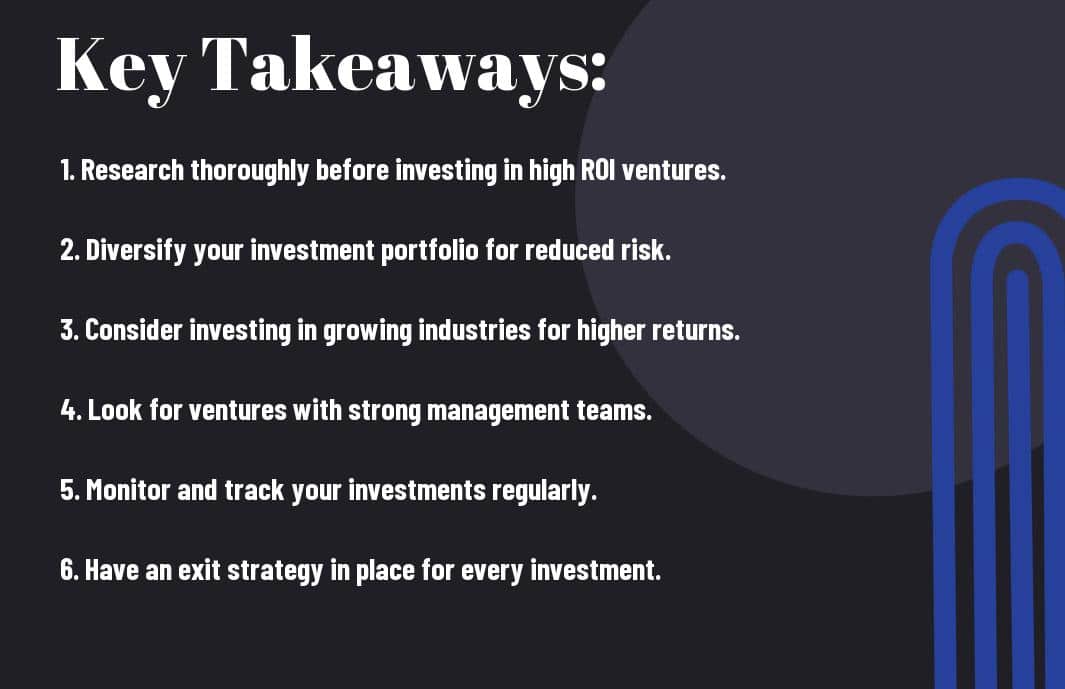Many aspiring investors dream of finding those high ROI business ventures that will provide them with substantial returns. From tech startups to real estate developments, the world of investing is filled with opportunities for those willing to take the risk. In this ultimate guide, we will explore the most important strategies, the most dangerous pitfalls, and the most positive outcomes when it comes to investing in high ROI business ventures. So, buckle up and get ready to take your investment game to the next level!
Key Takeaways:
- Research: Conduct thorough research before investing in any high ROI business venture. Understand the market dynamics, competition, and potential risks involved.
- Risk Management: Implement a robust risk management strategy to mitigate potential losses. Diversify your portfolio and have an exit plan in place.
- Due Diligence: Perform due diligence on the business, its founders, and financials. Ensure transparency and clarity in all investment terms and agreements.

Identifying High ROI Opportunities
Spotting Market Trends and Niches
You, as an investor looking for high ROI opportunities, need to keep your finger on the pulse of market trends and niches. By spotting emerging trends and identifying untapped niches, you can position yourself ahead of the competition and capitalize on lucrative business ventures. Look for industries experiencing rapid growth, consumer demands that are currently unmet, and innovative technologies disrupting traditional markets.
Due Diligence: Researching Like a Pro
To ensure you are making sound investment decisions, conducting thorough due diligence is crucial. Research like a pro by analyzing market trends, studying the competitive landscape, assessing the financial health of companies, and evaluating potential risks. Utilize a combination of quantitative data analysis and qualitative assessments to gain a comprehensive understanding of the market landscape.
Market trends can be your best friend or your worst enemy when it comes to investing. Stay ahead of the curve by monitoring shifts in consumer behavior, technological advancements, and regulatory changes. Identifying niche markets that are poised for growth can lead to lucrative investment opportunities. However, failing to conduct proper due diligence can result in investing in industries on the decline or companies with unsustainable business models. Bear in mind, knowledge is power in the world of investing.

Financial Strategies for Investment
After reading the Value Investing: Your Ultimate Guide to The Best Returns, you are ready to probe the world of high ROI business ventures. Here are some imperative financial strategies to consider for successful investing.
Allocating Resources Effectively
With so many investment opportunities out there, it’s crucial to allocate your resources effectively. By doing thorough research and analysis, you can identify the most promising ventures and concentrate your investments in those areas. This focused approach can maximize your ROI and minimize risks.
Diversification: The Investor’s Safety Net
Resources Diversification is like a safety net for investors. By spreading your investments across different industries, sectors, and asset classes, you can reduce the risk of significant losses. Diversification can protect your portfolio from the negative impact of a single underperforming investment, ensuring a more stable and balanced return on your overall investment portfolio.
Understanding the importance of diversification is key to building a resilient investment portfolio. While it may limit the potential for extraordinary gains in the short term, it acts as a safeguard against catastrophic losses that could jeopardize your financial future. Note, the goal is not just to make money, but also to preserve and grow your wealth over time.
So, embrace diversification as a fundamental principle in your investment strategy, and watch how it can mitigate risks and enhance the long-term performance of your portfolio.
Growth Hacking Your Business Venture
Bootstrapping vs. Seeking Investors
Many entrepreneurs face the classic dilemma of whether to bootstrap their business or seek investors. Bootstrapping your venture means relying on your savings and revenue to grow, avoiding the need to give up equity. On the other hand, seeking investors can provide you with the capital needed to scale quickly but may come with the cost of sharing ownership and decision-making power.
Scaling Smart: When To Pivot Or Persevere
Hacking your way through growth also involves knowing when to pivot or persevere. Sometimes, your initial business idea might not be hitting the mark, and it’s crucial to pivot and change your strategy. Other times, sticking to your guns and persevering through the challenges can lead to breakthrough success. It’s all about being smart and strategic in your decision-making process.
Seeking the right balance between pivoting and persevering is important for long-term success in any business venture. Gather feedback from customers, analyze market trends, and stay agile in your approach. Do not forget, pivoting doesn’t mean failure; it means adapting to ensure your business remains relevant and profitable in a constantly evolving market.
Risk Management and Exit Strategies
Evaluating Risks: The Bold and The Calculated
For successful investors, it’s not just about taking risks, but about taking calculated risks. The bold ones may get attention, but the calculated ones are the ones that pay off in the long run. When evaluating a new business venture, look at the potential risks involved and assess whether they are manageable or too risky to take on. By analyzing the risks with a clear head, you can make informed decisions that will increase your chances of high returns.
Knowing When to Hold, Fold, and Cash Out
For savvy investors, knowing when to hold onto an investment, fold and cut your losses, or cash out with a healthy profit is key to long-term success. Emotions can often cloud judgment, so it’s important to have clear exit strategies in place for each investment. Whether it’s reaching a specific ROI target, market conditions changing, or the business no longer aligning with your goals, having a solid plan for when to exit an investment is crucial.
Exit: It’s crucial to constantly monitor your investments and stay informed about market trends. When it’s time to exit, make sure to do so strategically and without emotion. The most dangerous thing you can do is hold onto a failing investment out of pride or attachment. On the flip side, the most positive thing is knowing when to cut your losses and move on to better opportunities. Be mindful of, it’s all part of the game of high ROI investing.
Summing up
The Ultimate Guide To Investing In High ROI Business Ventures provides a comprehensive blueprint for those looking to maximize their investments and see significant returns. It emphasizes the importance of research, due diligence, and strategic decision-making when choosing where to put your money. By following the advice and strategies outlined in this guide, you can increase your chances of success and make informed investment decisions. Keep in mind, investing in high ROI business ventures is not without risk, but with the right approach and mindset, the rewards can be well worth it. Stay focused, stay diligent, and go out there and crush it!
FAQ
Q: What is the key to investing in high ROI business ventures?
A: The key to investing in high ROI business ventures is to conduct thorough research and due diligence before committing any funds.
Q: How can I identify high ROI business ventures to invest in?
A: Look for businesses with a proven track record of profitability, strong growth potential, and a competitive advantage in the market.
Q: Is diversification important when investing in high ROI business ventures?
A: Yes, diversification is crucial to mitigate risks and maximize returns. Invest in a variety of industries and sectors to spread out your investment portfolio.
Q: What are some common pitfalls to avoid when investing in high ROI business ventures?
A: Avoid investing based on emotions, following the crowd, and not conducting thorough research. These can lead to poor investment decisions.
Q: How can I stay updated on the latest trends and opportunities in high ROI business ventures?
A: Stay informed by reading industry publications, attending conferences, networking with industry professionals, and utilizing online resources to stay ahead of the curve.
Q: What role does risk management play in investing in high ROI business ventures?
A: Risk management is imperative when investing in high ROI ventures. Assess the potential risks and have a strategy in place to minimize them to protect your investments.
Q: What are some tips for maximizing returns when investing in high ROI business ventures?
A: Look for businesses with scalable models, focus on long-term growth potential, and continually reassess and adjust your investment strategy to adapt to market changes.





